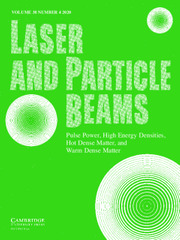Crossref Citations
This article has been cited by the following publications. This list is generated based on data provided by
Crossref.
FISHER, DIMITRI V.
HENIS, ZOHAR
ELIEZER, SHALOM
and
MEYER-TER-VEHN, JUERGEN
2006.
Core holes, charge disorder, and transition from metallic to plasma properties in ultrashort pulse irradiation of metals.
Laser and Particle Beams,
Vol. 24,
Issue. 1,
p.
81.
ANWAR, MUHAMMAD SHAHBAZ
LATIF, ANWAR
IQBAL, M.
RAFIQUE, M. SHAHID
KHALEEQ-UR-RAHMAN, M.
and
SIDDIQUE, SOFIA
2006.
Theoretical model for heat conduction in metals during interaction
with ultra short laser pulse.
Laser and Particle Beams,
Vol. 24,
Issue. 3,
p.
347.
BEILIS, ISAK I.
2007.
Laser plasma generation and plasma interaction with ablative
target.
Laser and Particle Beams,
Vol. 25,
Issue. 1,
p.
53.
Cerchez, M.
Jung, R.
Osterholz, J.
Toncian, T.
Willi, O.
Mulser, P.
and
Ruhl, H.
2008.
Absorption of Ultrashort Laser Pulses in Strongly Overdense Targets.
Physical Review Letters,
Vol. 100,
Issue. 24,
Fang, Ranran
Zhang, Duanming
Wei, Hua
Li, Zhihua
Yang, Fengxia
and
Gao, Yihua
2010.
Improved two-temperature model and its application in femtosecond laser ablation of metal target.
Laser and Particle Beams,
Vol. 28,
Issue. 1,
p.
157.
Ren, Yunpeng
Chen, J. K.
and
Zhang, Yuwen
2011.
Optical properties and thermal response of copper films induced by ultrashort-pulsed lasers.
Journal of Applied Physics,
Vol. 110,
Issue. 11,
Vorobyev, A. Y.
and
Guo, Chunlei
2011.
Reflection of femtosecond laser light in multipulse ablation of metals.
Journal of Applied Physics,
Vol. 110,
Issue. 4,
Byskov-Nielsen, Jeppe
Savolainen, Juha-Matti
Christensen, Martin Snogdahl
and
Balling, Peter
2011.
Ultra-short pulse laser ablation of copper, silver and tungsten: experimental data and two-temperature model simulations.
Applied Physics A,
Vol. 103,
Issue. 2,
p.
447.
Loboda, P.A.
Smirnov, N.A.
Shadrin, A.A.
and
Karlykhanov, N.G.
2011.
Simulation of absorption of femtosecond laser pulses in solid-density copper.
High Energy Density Physics,
Vol. 7,
Issue. 4,
p.
361.
Zhang, D.
and
Guan, L.
2014.
Comprehensive Materials Processing.
p.
125.
Tsibidis, George D.
2014.
Thermal response of double-layered metal films after ultrashort pulsed laser irradiation: The role of nonthermal electron dynamics.
Applied Physics Letters,
Vol. 104,
Issue. 5,
Ahmad, Rabia
Rafique, M. Shahid
Tahir, M. Bilal
and
Malik, Huma
2014.
Implantation of various energy metallic ions on aluminium substrate using a table top laser driven ion source.
Laser and Particle Beams,
Vol. 32,
Issue. 2,
p.
261.
Lotov, K. V.
Gubin, K. V.
Leshchenko, V. E.
Trunov, V. I.
and
Pestryakov, E. V.
2015.
Guiding femtosecond high-intensity high-contrast laser pulses by copper capillaries.
Physics of Plasmas,
Vol. 22,
Issue. 10,
Polek, M.
and
Hassanein, A.
2016.
Dependence of silicon ablation regimes on fluence during ultrafast laser irradiation.
Laser and Particle Beams,
Vol. 34,
Issue. 1,
p.
143.
Suslova, A.
and
Hassanein, A.
2017.
Simulation of femtosecond laser absorption by metallic targets and their thermal evolution.
Laser and Particle Beams,
Vol. 35,
Issue. 3,
p.
415.
Suslova, Anastassiya
Elsied, Ahmed
and
Hassanein, Ahmed
2018.
Computer simulation and experimental benchmarking of ultrashort pulse laser ablation of metallic targets.
Laser and Particle Beams,
Vol. 36,
Issue. 1,
p.
144.
Balling, Peter
2020.
Handbook of Laser Micro- and Nano-Engineering.
p.
1.
Petrov, G M
and
Davidson, A
2021.
Collisional and transport parameters of Cu in the warm dense matter regime calculated using the average atom model.
Plasma Physics and Controlled Fusion,
Vol. 63,
Issue. 12,
p.
125011.
Balling, Peter
2021.
Handbook of Laser Micro- and Nano-Engineering.
p.
3.
Amouye Foumani, Arham
Förster, Daniel J.
Ghorbanfekr, Hossein
Weber, Rudolf
Graf, Thomas
and
Niknam, Ali Reza
2021.
Atomistic simulation of ultra-short pulsed laser ablation of metals with single and double pulses: An investigation of the re-deposition phenomenon.
Applied Surface Science,
Vol. 537,
Issue. ,
p.
147775.

